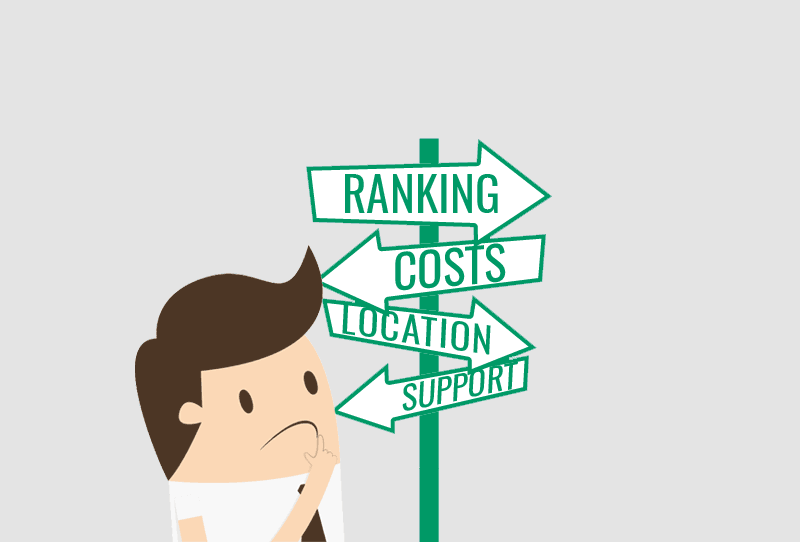If you are a trader then you have probably had an experience with a number of different brokers, some would have been good to you, others would have been not so good. No matter which broker you are with, there will be little things that you notice that may make you think about changing brokers and looking for a new one. So we are going to be looking at 10 tell-tale signs that you need to get a new broker. It is important to note that not any one solo broker is perfect, there will always be things that another broker does best, you need to weigh up the pros and cons of the one that you are using to work out whether a new one is actually needed. These are simply some of the things to look out for that could potentially go into the cons section of that list.
Can’t Contact Support: At times we all need help, maybe we are unsure of something and we want to ask a question, sometimes something might go wrong, with a trade or with a deposit. When these things happen we will want to get in contact with the support tea, unfortunately, it is not always that easy. In fact, we have been with some brokers where we have tried and tried to get in contact with the support team only to find that we simply cannot get in contact with them at all. If this happens to you, then it is a good idea to change broker, the support team is meant to be there to help, if you cannot contact them, then you are pretty much on your own.
Unhelpful support team: Similarly to above, the support team is there to help, so there is nothing worse than getting in touch and they simply aren’t bothered or do not know how to help. We are contacting them because they should know what to do or how to solve things with their own broker. If they do not, then it doesn’t give a good impression about the broker. What else might they not know about? Most likely time to get out of that broker if they are not helping you with what you need.
Not enough leverage: As traders, we love to trade with leverage, it increases our profit potential tenfold, but also our loss potential, so you should use it with caution. There has been a shakeup recently where a lot of brokers have reduced their leverage, so if you are used to trading with something like 500:1, your broker may have now forced you down to 30:1. If this is the case, and you wish to continue with huge leverage, then you may need to look for a new broker that will still offer you the higher leverage.
Spreads are too high: Spreads are one of the ways that a broker makes their money, some of them add a little bit onto the spreads in order to make money. That is normal and not something to be concerned about, but what should be checked is how much they have added on, if it is extremely high, such as the EURUSD pair being at 3 pips, then it would be better to find a cheaper one. You should also look out for brokers that have a commission and then add to the spreads, which is double costs for you, something to avoid.
Commissions are too high: Commissions are the other way that a lot of brokers make their money, this is more prevalent on ECN and STP brokers where the spreads are kept low. Some brokers offer really good commissions at or below $6 per lot traded, but there are some that go as high as $20 per lot traded, if that is your broker, you are losing out on a lot of your profits, paying the majority of it back to the broker. If your broker has a commission higher than $6, then you should probably look for a new one that can save you quite a lot of money.
Slow servers: There is nothing worse than finding the perfect trade, placing the trade, and then nothing, it takes a few seconds or in the worst-case scenario, even minutes for the trait to be placed, meaning that you missed your optimum entry point and could potentially lose out on some of the profits. This Can also happen with stop losses, the price is drooping it gets to your stop loss, but the server then takes a few seconds to close the trade, buy that time, the price has moved further down past your stop loss. If this happens on a regular basis, we would suggest looking for a new broker.
Deposit and withdrawal fees: Some brokers are still charging for deposits and withdrawals, this is something that happened a lot many years ago but most brokers have moved away from the practice. The worst are deposit feels, we are still not sure why you would be charged to give your money to the broker. If your broker is charging you deposits or withdrawals then you are basically throwing away some of your profits, they make their money on commissions and spreads, you do not need to be giving them any extra money.
Forced bonuses: Some brokers have a practice of forcing a bonus on you, a bonus sounds like a good thing, but the terms that come with them are often a little crazy. Things like needing to trade 10 lots to convert $1 of bonus money into real funds. If that was just the bonus then it could be fine, but many brokers do not allow you to withdraw your deposit until you have converted the bonus into real funds, which would take thousands of lots, meaning that you have very little chance of actually getting you money back out. If a broker tries to force a bonus on you, quickly walk the other way.
Odd chart behaviour: Sometimes things don’t quite add up on the charts, maybe the price is jumping when it isn’t on any other broker, or your stop losses are conveniently being triggered before the price reverses. These are things that some of the more dubious brokers do, the market makers who are actually trading against you. If there are strange behaviours on the markets then the broker could be influencing them and this is a sure sign that you should be getting away from that broker.
Requesting more deposits: Some brokers have a habit of calling you up asking for you to deposit more funds, or if you have not yet deposited, to make a deposit. If your broker does this, run away as fast as you can, those are clear signs that your broker is just looking for your money and it is what a lot of scam brokers do. So if you get a call or email asking for money, do not deposit and close that broker’s account straight away.
So those are 10 of the tell-tale signs that you need to look for a new broker. Remember, as we mentioned before, not any one single broker will be perfect, you will always find things that could be done differently with the broker that you are using. That doesn’t mean that you need to jump ship though, work with your broker to see if they can change things, some are willing to do that, but if your broker has quite a few of the things above, then you should probably start looking for a new one.







